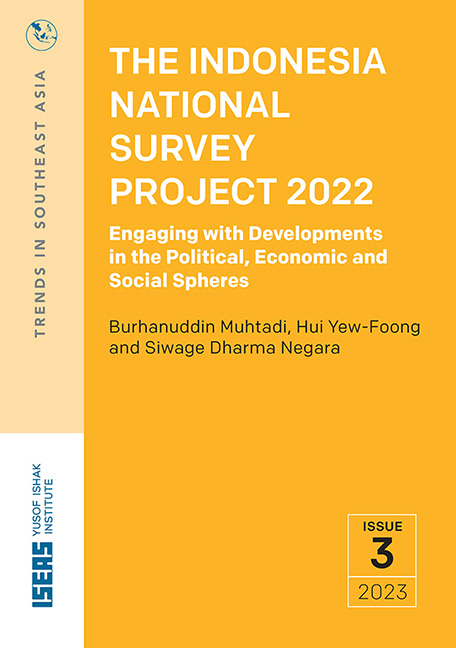 The Indonesia National Survey Project 2022
The Indonesia National Survey Project 2022 Published online by Cambridge University Press: 09 January 2024
Islamic Religious Practices
This subsection looks into the influence of Islam on society, especially in the context of Indonesia being a Muslim-majority country. Muslims constitute 91.1 per cent of the sample, and their responses are what we examine here.
The majority of Muslim respondents “often” or “always” carry out their obligatory acts of worship, such as fasting during the month of Ramadan (93 per cent), performing the obligatory daily prayers (80.2 per cent), and observing Friday prayers (47 per cent, but if we only consider men, the figure rises to 83.7 per cent). Meanwhile, in terms of paying tithe (zakat mal) and giving alms, 53.8 per cent and 70.9 per cent “often” or “always” observe these practices respectively. In contrast, due to the high cost of performing the haj and umrah, more than 90 per cent of Muslim respondents have never performed these pilgrimages.
The majority of Muslim respondents (69.8 per cent) are of the opinion that all Muslim women should wear the Islamic headscarf or hijab, while 22.3 per cent leave the decision to the individuals, and 8 per cent feel that Muslim women do not have to wear the hijab. Interestingly, the view that Muslim women must wear the hijab is slightly more likely to be held by female than male respondents, and by rural respondents and respondents of low and medium income (Figure 21).
In terms of practice, 61.9 per cent of Muslim women respondents claim that they usually wear the hijab, while 34.9 per cent wear the hijab depending on the situation, and only 3.3 per cent do not wear the hijab (Figure 22).
The majority of Muslim respondents (88.6 per cent) agree that implementing Islamic law will bring benefits to society, especially in terms of strengthening moral values (62.5 per cent), although this latter figure has dropped from 67.2 per cent as per the INSP2017 (Figure 23). Other perceived benefits, such as the spread of Islam (11.8 per cent), increasing public security (8.9 per cent), and helping to eradicate corruption (5.4 per cent), approximate the level of responses for the INSP2017. Meanwhile, 11.4 per cent of respondents are convinced that the application of Islamic law brings very little or no benefit.
To save this book to your Kindle, first ensure [email protected] is added to your Approved Personal Document E-mail List under your Personal Document Settings on the Manage Your Content and Devices page of your Amazon account. Then enter the ‘name’ part of your Kindle email address below. Find out more about saving to your Kindle.
Note you can select to save to either the @free.kindle.com or @kindle.com variations. ‘@free.kindle.com’ emails are free but can only be saved to your device when it is connected to wi-fi. ‘@kindle.com’ emails can be delivered even when you are not connected to wi-fi, but note that service fees apply.
Find out more about the Kindle Personal Document Service.
To save content items to your account, please confirm that you agree to abide by our usage policies. If this is the first time you use this feature, you will be asked to authorise Cambridge Core to connect with your account. Find out more about saving content to Dropbox.
To save content items to your account, please confirm that you agree to abide by our usage policies. If this is the first time you use this feature, you will be asked to authorise Cambridge Core to connect with your account. Find out more about saving content to Google Drive.